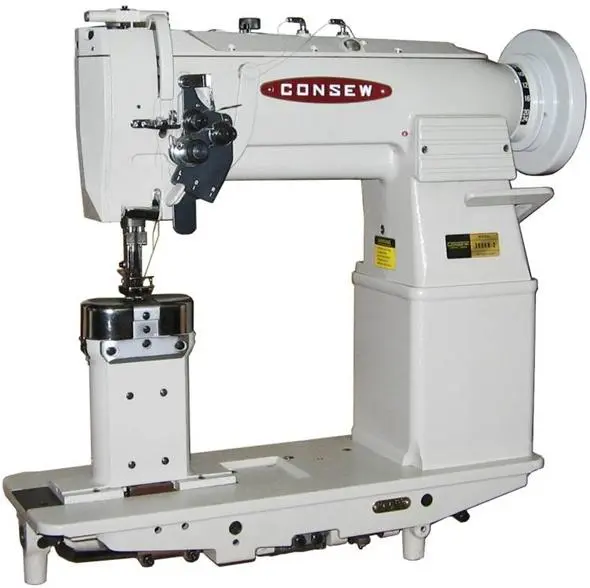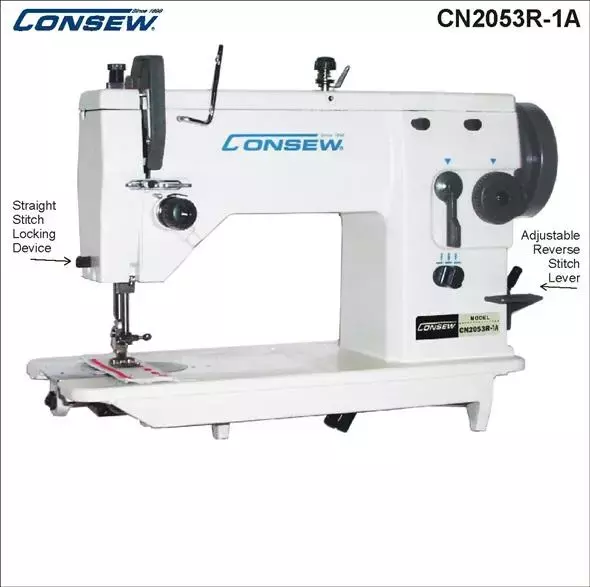Your Guide to Consew Sewing Machines
2020-10-12
Consew sewing machines have taken over the industrial machine market by storm. They're in a class all their own, and it's for a good reason. They're durable, simple, offer a wide variety of the industrial machines, and are quickly becoming the favorite among professionals. But which one should you choose? That's a tough one. Here is a complete guide to Consew's most popular sewing machines!
Top Reasons to Choose an Industrial Sewing Machine
Industrial machines are meant for around-the-clock use. They should hold up through many years and have very little to fuss over. The basic expectations from a Consew device will have top-of-the-line parts that are durable.
Going beyond our ability, there are a few different advantages to choosing a Consew sewing machine. They're extremely powerful, and their motors are sturdy and long-lasting. Because of their power, it's unlikely that you'll ever have problems with skipping stitches. Consew sewing machines, when compared to other industrial-grade sewing machines, often outperform in power.
Like many industrial sewing machines, they work at a much faster stitches-per-minute rate then what a standard retail machine can do. You can purchase an industrial sewing machine for home sewing projects. In fact, if you craft quite often, it could pay off to invest in an industrial sewing machine because you would complete projects more quickly and often with a more professional final result. With a Consew sewing machine, you should expect a rate of 1000 to 5,000 stitches per minute. These stitches can be done through multiple layers of fabric, which means that it's easier to handle larger or more complex projects.
Finally, anyone who's worked with a standard retail sewing machine knows that versatility is limited. On a standard retail machine, you might have hundreds of options in different stitching but not be able to handle certain fabrics. With industrial sewing machines, including Consew machines, versatility is impressive. On a Consew, you should expect it to handle leather, upholstery fabric, as well as delicate materials such as costume fabrics and tulle.
Even with the many advantages and selecting an industrial sewing machine, there are a few disadvantages, most notably the size of the machines and the price. A Consew machine does need to be mounted to a dedicated table. They are all heavy and are not meant to be moved from location to location. But, when it comes to Consew pricing, there's a bit of flexibility.
Price Range for Consews
Any industrial sewing machine is an investment, but you often get much more return off an industrial sewing machine than what you would expect from a home sewing machine. What is important with researching the price of a Consew or an industrial sewing machine is that most listings aren't for all items together.
Depending on where you purchase the machine, and may only be paying for the sewing machine itself but not the table or additional Parts. Many online listings are only for the motor or for the sewing machine without the motor. Do careful research to ensure that you're getting the entire Consew machine with everything you need to use when it arrives.
There are a few Consew models that are just shy of a thousand dollars, and from there, they can stretch into the $8,000 realm. Think about your budget when researching your Consew options, so you don't fall in love with a machine that's out of your price range.

Consew Basics
Before we get into the Consew basics, it’s worth addressing that every single model requires maintenance. If you’re looking to move from a residential or commercial machine into an industrial machine, then maintenance will be in your future even if you purchase a self-lubricating model.
Consew uses a standardized stitch-type approach where they have 1A, 2A, and 3A. The 1A is your standard for all sewing projects as it’s a simple straight chain stitch. 2A is for stretchy materials, decorative stitches, and elastic. 3A manages what the 2A accomplishes and gives an additional stitch for reinforcement.
Now, most models will advertise what stitch types they come with right in the model name. Most Consew machines do not come with all the stitch types. For example, the “Consew 347R-3A” the “3A” refers to the machine's stitch type. The Consew 199R is another 3A model but is more portable than most of the other Consew options.
Consews also have the unique ability to perform both chain stitches and lock stitches. They offer a bit of a different look and different benefits. The chain stitch is usually for the outside of the garment for a decorative seam. A lockstitch provides the durability needed on seams that have a lot of pressure or tugging.
Consew machines come in a variety of prices, and some options are very affordable for home sewers. However, the variations in abilities are generally the same. The stitch type is often the largest difference, but there are also longarm machines such as the Consew 733R-5 with the extra heavy-duty long arm and lockstitch.
Without a doubt, you can find a Consew machine that fits your needs, but each machine deserves a fair amount of research. Make sure that you have the option to get everything you need from one retailer. Contact our customer service team if you have any questions on whether a Consew is right for you. We are here to help and happy to answer any lingering questions.





